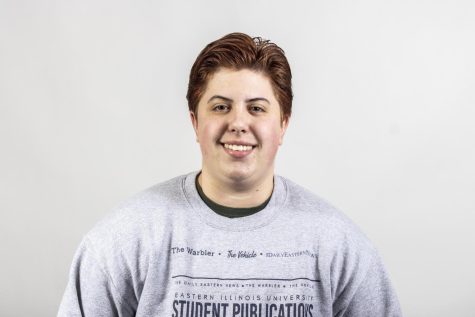Forum held on sexual assault awareness
April 20, 2021
Sexual Assault and Counseling Services and Eastern’s Student Government partnered to hold a forum to promote sexual assault awareness Tuesday night.
The forum was lead by Noor Khamisani, student body president, and featured various experts on fields related to sexual assault.
The expert included Amanda Feder and Stephanie Anderson from SACIS, assistant criminology professor Dr. Mari Kita, Director of Counseling Services Lindsay Wilson and the Title IX Coordinator Dr. Shawn Peoples.
Each speaker prepared a short informational speech on topics like media and representation, gender and sexual assault, self-protection, myths about sex, shame and healing, and resources on campus.
Amanda Feder was the first speaker to give a presentation, so she explained some of the basics of what sexual violence is; this includes any unwanted sexual behavior like inappropriate touches, gestures and comments.
Feder also explained the concept of consent as “an agreement that is informed and is an enthusiastic ‘yes.’”
Lindsay Wilson used some of her presentation time to talk about misinformation surrounding consent, assault and harassment.
“There’s many different songs that contribute to romanticizing abusive behavior,” Wilson said.
She listed “I’ll Be Watching You” by Sting and “Animals” by Maroon 5 as examples of popular songs that “contribute to rape culture.” Wilson also pointed out that many scenes in movies, TV shows and advertisements promote similar ideas.
The next speaker was Mari Kita, who brought the perspective of feminist criminology since that is her field of study.
“I want to stress this factor of a power dynamic that often becomes the cause of sexual violence. For example, with men and women, men tend to have more physical force and oftentimes have more social status and more financial power,” Kita said. “They can abuse their power to control women’s bodies in the form of sexual assault.”
Kita explained that this kind of power dynamic is often the cause for abuse or sexual assault whether it is due to gender or a different kind of power dynamic.
Karen Swenson provided data to help determine what may help people protect themselves from sexual violence while on campus.
Swenson used the CDC as a source to say that universities should release data about sexual assaults on their campuses so that students can know when and where sexual violence happens. Universities are also asked to provide training for incoming students on how to prevent sexual violence.
“This also includes training in peer groups, so calling out male athletes and having training come from the coaches so they can address hyper-masculine peer norms,” Swenson said.
Kathleen O’Rourke spoke next, discussing several myths about sexual assault.
“Another myth is that false accusations are common. In other words, ‘when people say they’ve been sexually assaulted, they’re really just making it up,’” O’Rourke said. “That is far from the truth. Anywhere from 2-8 percent of cases that are reported are false. It’s a very low statistic, it’s very uncommon.”
O’Rourke also covered myths like that people “ask for” sexual assault, that only women get assaulted, and that people don’t usually know their assaulter.
Shawn Peoples was the final speaker in the forum. She shared the various resources on campus that students can use to report or just cope with any kind of sexual assault.
Specifically, Peoples recommended the on-campus counseling services.
Luke Taylor can be reached at 581-2812 or at [email protected].














































